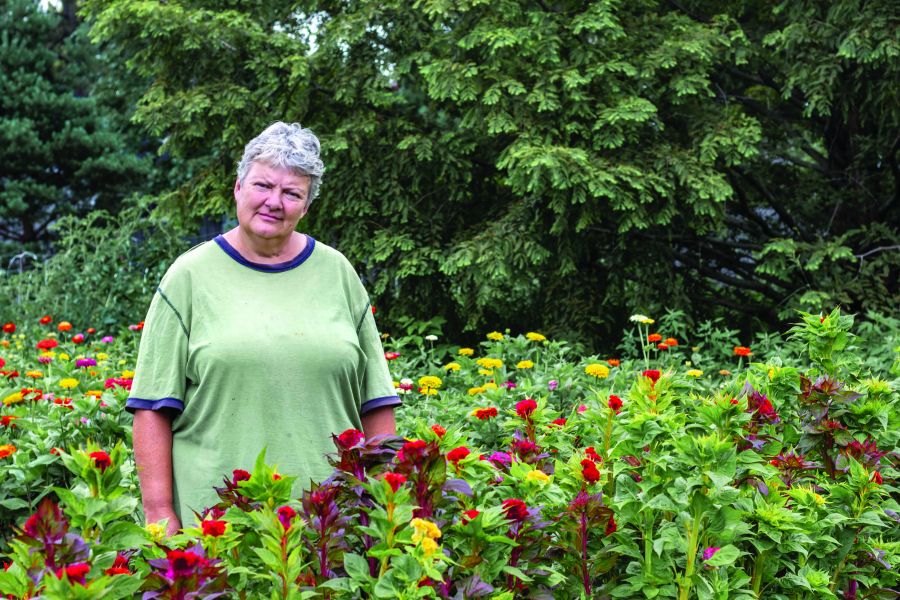In another chapter of our “Farm-hers” series, we’ll meet Rose Bartel, the dominant half of the team at Bartel Organics.
She and her husband Ken run the three-acre farm, selling a mix of edible produce and floral arrangements.
As Rose puts it, she really runs it, and Ken does what he’s told.
Rose has a no-nonsense way of speaking, a quick and genuine smile and a strong vision for the farm — a combination which may have been what helped the business reach a point of smooth sailing.
That and a talent for arranging floral bouquets, which generally sell out every Saturday at the Niagara-on-the-Lake farmers’ market.
Bartel stands at the back of their booth, cutting and arranging flowers from 7:30 a.m. to about 10:30 a.m., while Ken greets customers.
“Poor Ken, it was a real jump in the fire for him to be the front man at the market, while I make cut flower arrangements behind our table,” she said.
The seeds of Bartel’s career may have been planted when she was a child.
“I used to go around the fields picking flowers for everyone. I’m not sure if it was me or the big stink my mother made, but I loved the flowers.”
One of five sisters, Rose jokes she always said they “were a handful,” holding up her open palm and pointing out the five fingers.
Rose and her sisters all worked at Reimer Nurseries in NOTL when they finished elementary school, Rose staying for 11 summers.
It was there she gained a real appreciation for farming, soaking up us much information as she could.
“I was always asking ‘why? why? why?’ — I think I bothered my boss with all of my questions. But they were good to us.”
“I always loved how nice it looked when you finished weeding a row,” Rose added.
She must still love that look, as the rows throughout her three-acre farm are quite tidily tended.
The path to starting up the farm has been a rather organic one, generally having to do with Bartel’s hands getting covered in soil.
After her years at the nursery, she studied horticulture at Niagara College, worked at various greenhouses and florists, and continued a nearly lifelong tradition of growing crops in the family garden.
Her family, then with three young sons, moved to Perth so Ken could pursue his dream of studying heritage carpentry.
“We just packed up and went — it was one of the best things we ever did, because it disrupted our lives in a good way,” said Rose.
She tells the story of their launch into the world of farmers markets from there.
“We’d been backyard growers all along, and now we took it up a notch. We had about two acres on good soil — I got a booth at the Perth farmer’s market selling cut flowers, dried flower arrangements, and some of our vegetables — tomatoes, peppers, eggplant, beans. I made $50 on my first day at the market.”
She’s been selling at markets ever since, and was one of the seminal vendors in the first year of the Farmers Market at the Village, where her brightly-coloured and lushly-laden tables now anchor the entrance each week.
It’s a lot of work, preparing everything for market days, Bartel said.
“All we do Friday is prepare for going to the market on Saturday. Market prep is a huge part of any farmer’s work. On Tuesday and Wednesday we prepare for the CSA boxes; Monday and Thursday is weeding, picking, planting.”
“When I come home from the market on Saturday afternoon, I sleep. I’m pooped.”
And often, markets aren’t enough to keep things going.
For small farms in Ontario, the Community Supported Agriculture box program is a way to increase the farm’s profits in the leaner months, allowing farmers like Rose to pre-sell products.
People pre-pay, usually in the early spring when produce farmers are often at the end of their financial rope, for a full season of produce. When summer comes, members of the CSA program go to the farm weekly to collect on their investment.
The program has doubled the income of Bartel Organics, and Bartel adds, is “a good way of visiting and talking with people.”
Bartel also explores interesting new crops every year — this year it’s purslane, chicory and ground cherries.
“We do five to six plantings of each crop — we’re on our fifth or sixth planting of lettuce now.”
She gestures towards flats of tiny seedlings in the sun.
The farm is organic, with no sprays or chemicals of any kind. Through careful companion planting and crop rotation, there is little — if any — need for them. The occasional pest is taken care of by hand and moved away from the plant so the eggs won’t get a chance to repopulate the plants.
“People want organic because they want live food,” Rose said.
“We grow organically because I learned at Niagara College that everyone sprayed and sprayed and thought everything was fine, but then realized it fills the body with toxins to a point of no return.”
She also believes it strips the soil of its microbiome — and healthy soil is paramount to Bartel.
Many of their homes, including the one to their current farm, have been chosen based on soil quality.
“It was too cold for too long in Perth, so we moved back to Niagara-on-the-Lake for a longer growing season,” she said.
“We moved to a house where we had previously been tenants. We knew the property had good soil, and we wanted to farm it.”
Vision and logic have led the way to success — Bartel said.
“Can you believe it? We make this much profit from our tiny farm!”
In our next issue read about Kim McQuhae, a farm-her who got into it raising livestock largely on a whim.










